What are the four thread pools that come with Java?
What are the four predefined thread pools in java?
newSingleThreadExexcutor: Thread pool with a single number of threads (number of core threads = maximum number of threads = 1)
newFixedThreadPool: Fixed number of threads Pool (number of core threads = maximum number of threads = custom)
-
newCacheThreadPool: Cacheable thread pool (number of core threads = 0, maximum number of threads = Integer.MAX_VALUE)
newScheduledThreadPool: Thread pool that supports scheduled or periodic tasks (number of core threads = custom, maximum number of threads = Integer.MAX_VALUE)
Four kinds of threads What's the difference between pools?
The above four thread pool classes all inherit ThreadPoolExecutor and directly return new ThreadPoolExecutor (parameters) when created. The difference between them is that the parameters in the defined ThreadPoolExecutor (parameters) are different, and ThreadPoolExecutor inherits the ExecutorService interface class.
newFixedThreadPool
Definition:
xecutorService executorService=Executors.newFixedThreadPool(2);
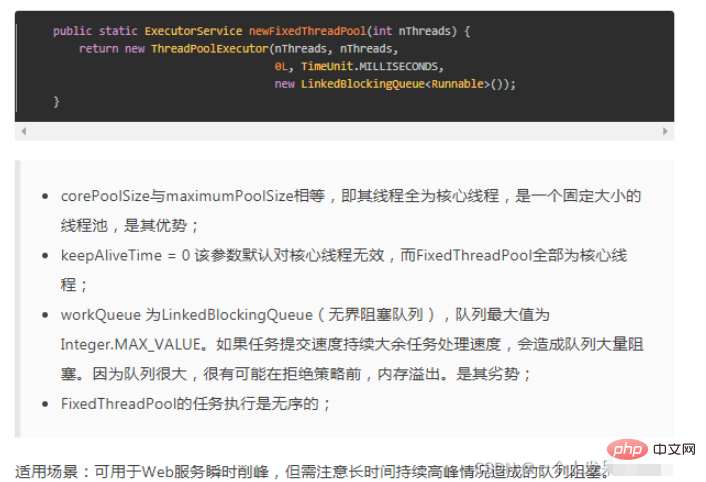
Disadvantages: LinkBlockQueue's linked list blocking queue is used. When the accumulation speed of tasks is greater than the processing speed, it is easy to accumulate tasks and cause OOM memory overflow
newSingleThreadExecutor
##Definition: ExecutorService executorService =Executors.newSingleThreadExecutor();


Definition: ExecutorService executorService=Executors.newCacheThreadPool();
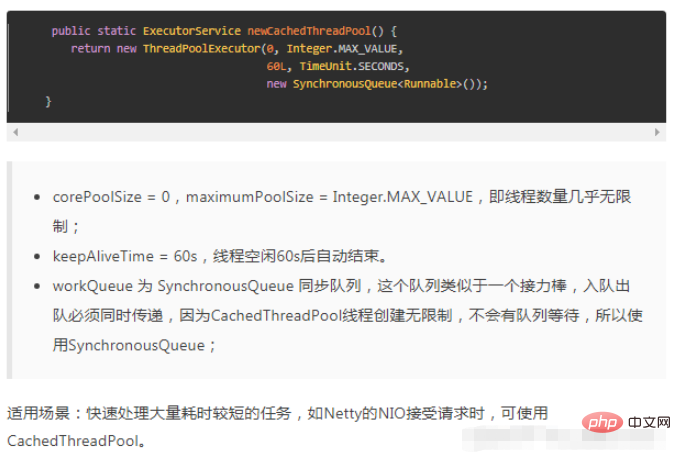
Definition: ExecutorService executorService=Executors.newScheduledThreadPool(2);What are the important parameters of the thread pool? ThreadPoolExecutor construction method is as follows:源码: public static ScheduledExecutorService newScheduledThreadPool(int corePoolSize) { //ScheduledThreadPoolExecutor继承ThreadPoolExecutor return new ScheduledThreadPoolExecutor(corePoolSize); } public ScheduledThreadPoolExecutor(int corePoolSize) { //ScheduledThreadPoolExecutor继承ThreadPoolExecutor,故super()会调用ThreadPoolExecutor的构造函数初始化并返回一个ThreadPoolExecutor,而ThreadPoolExecutor使实现ExecutorService接口的 //最终ScheduledThreadPoolExecutor也和上面几种线程池一样返回的是ExecutorService接口的实现类ThreadPoolExecutor super(corePoolSize, Integer.MAX_VALUE, 0, NANOSECONDS, new DelayedWorkQueue()); }Copy after login
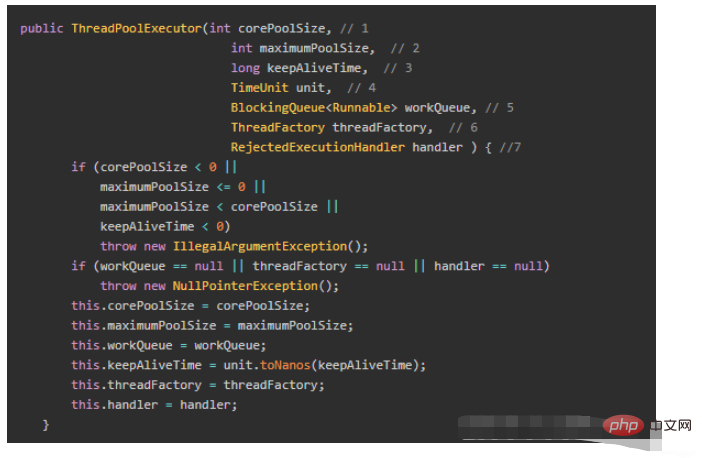
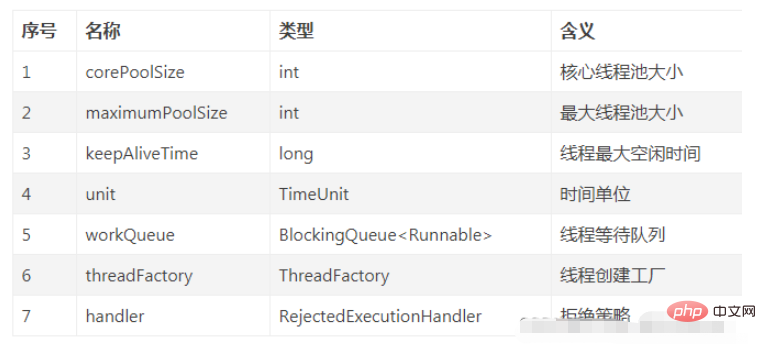
- ##keepAliveTime refers to the current number of threads located in [core Number of threads, maximum number of threads] How long do these non-core threads wait for idle time without any work before exiting the thread pool;
- The size of the waiting list and the maximum number of threads It has nothing to do with it. Thread creation priority = core thread> blocking queue> thread expansion (threads can be expanded only when the current number of core threads is less than the maximum number of threads)
- If the core The number of threads is 5, the waiting queue length is 3, and the maximum number of threads is 10: When the number of threads continues to increase, 5 core threads are created first. When the number of core threads is full, the threads are thrown into the waiting queue. When the waiting queue is full (3 threads), the maximum number of threads will be compared at this time (you can only appear after waiting for the maximum number of threads to be filled), and you can continue to create 2 threads (5 3 2). If the number of threads exceeds the maximum number of threads, the execution will be rejected. Strategy;
- If the number of core threads is 5, the waiting queue length is 3, and the maximum number of threads is 7: When the number of threads continues to increase, create 5 core threads first, and the number of core threads is full. Then throw the thread into the waiting queue. When there are 2 threads in the waiting queue, the maximum number of threads is reached (5 2 = 7), but the waiting queue is not full yet, so you don’t need to worry about the maximum number of threads until the waiting queue is full. (3 blocked threads), the maximum number of threads will be compared at this time (only the maximum number of threads waiting for the queue to be lost can exit), at this time the core is waiting for the queue to be lost = 5 3 = 8>7 = the maximum number of threads, that is, it has been reached If the maximum number of threads is reached, the rejection policy will be implemented;
- If the waiting queue is set to LinkedBlockingQueue unbounded queue, this queue is infinite, and it will never reach the maximum judgment value. What about the number of threads?
如何自定义线程池
可以使用有界队列,自定义线程创建工厂ThreadFactory和拒绝策略handler来自定义线程池
public class ThreadTest {
public static void main(String[] args) throws InterruptedException, IOException {
int corePoolSize = 2;
int maximumPoolSize = 4;
long keepAliveTime = 10;
TimeUnit unit = TimeUnit.SECONDS;
BlockingQueue<Runnable> workQueue = new ArrayBlockingQueue<>(2);
ThreadFactory threadFactory = new NameTreadFactory();
RejectedExecutionHandler handler = new MyIgnorePolicy();
ThreadPoolExecutor executor = new ThreadPoolExecutor(corePoolSize, maximumPoolSize, keepAliveTime, unit,
workQueue, threadFactory, handler);
executor.prestartAllCoreThreads(); // 预启动所有核心线程
for (int i = 1; i <= 10; i++) {
MyTask task = new MyTask(String.valueOf(i));
executor.execute(task);
}
System.in.read(); //阻塞主线程
}
static class NameTreadFactory implements ThreadFactory {
private final AtomicInteger mThreadNum = new AtomicInteger(1);
@Override
public Thread newThread(Runnable r) {
Thread t = new Thread(r, "my-thread-" + mThreadNum.getAndIncrement());
System.out.println(t.getName() + " has been created");
return t;
}
}
public static class MyIgnorePolicy implements RejectedExecutionHandler {
@Override
public void rejectedExecution(Runnable r, ThreadPoolExecutor e) {
doLog(r, e);
}
private void doLog(Runnable r, ThreadPoolExecutor e) {
// 可做日志记录等
System.err.println( r.toString() + " rejected");
// System.out.println("completedTaskCount: " + e.getCompletedTaskCount());
}
}
static class MyTask implements Runnable {
private String name;
public MyTask(String name) {
this.name = name;
}
@Override
public void run() {
try {
System.out.println(this.toString() + " is running!");
Thread.sleep(3000); //让任务执行慢点
} catch (InterruptedException e) {
e.printStackTrace();
}
}
public String getName() {
return name;
}
@Override
public String toString() {
return "MyTask [name=" + name + "]";
}
}
}运行结果:
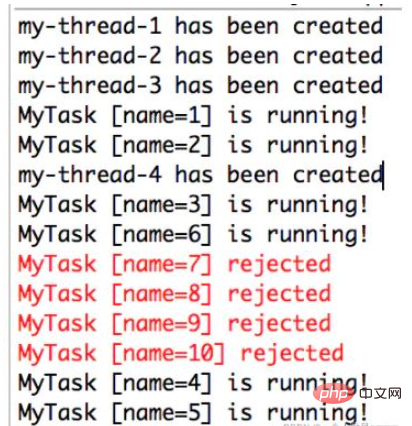
其中7-10号线程被拒绝策略拒绝了,1、2号线程执行完后,3、6号线程进入核心线程池执行,此时4、5号线程在任务队列等待执行,3、6线程执行完再通知4、5线程执行
The above is the detailed content of What are the four thread pools that come with Java?. For more information, please follow other related articles on the PHP Chinese website!

Hot AI Tools

Undresser.AI Undress
AI-powered app for creating realistic nude photos

AI Clothes Remover
Online AI tool for removing clothes from photos.

Undress AI Tool
Undress images for free

Clothoff.io
AI clothes remover

Video Face Swap
Swap faces in any video effortlessly with our completely free AI face swap tool!

Hot Article

Hot Tools

Notepad++7.3.1
Easy-to-use and free code editor

SublimeText3 Chinese version
Chinese version, very easy to use

Zend Studio 13.0.1
Powerful PHP integrated development environment

Dreamweaver CS6
Visual web development tools

SublimeText3 Mac version
God-level code editing software (SublimeText3)

Hot Topics
 1386
1386
 52
52
 Perfect Number in Java
Aug 30, 2024 pm 04:28 PM
Perfect Number in Java
Aug 30, 2024 pm 04:28 PM
Guide to Perfect Number in Java. Here we discuss the Definition, How to check Perfect number in Java?, examples with code implementation.
 Weka in Java
Aug 30, 2024 pm 04:28 PM
Weka in Java
Aug 30, 2024 pm 04:28 PM
Guide to Weka in Java. Here we discuss the Introduction, how to use weka java, the type of platform, and advantages with examples.
 Smith Number in Java
Aug 30, 2024 pm 04:28 PM
Smith Number in Java
Aug 30, 2024 pm 04:28 PM
Guide to Smith Number in Java. Here we discuss the Definition, How to check smith number in Java? example with code implementation.
 Java Spring Interview Questions
Aug 30, 2024 pm 04:29 PM
Java Spring Interview Questions
Aug 30, 2024 pm 04:29 PM
In this article, we have kept the most asked Java Spring Interview Questions with their detailed answers. So that you can crack the interview.
 Break or return from Java 8 stream forEach?
Feb 07, 2025 pm 12:09 PM
Break or return from Java 8 stream forEach?
Feb 07, 2025 pm 12:09 PM
Java 8 introduces the Stream API, providing a powerful and expressive way to process data collections. However, a common question when using Stream is: How to break or return from a forEach operation? Traditional loops allow for early interruption or return, but Stream's forEach method does not directly support this method. This article will explain the reasons and explore alternative methods for implementing premature termination in Stream processing systems. Further reading: Java Stream API improvements Understand Stream forEach The forEach method is a terminal operation that performs one operation on each element in the Stream. Its design intention is
 TimeStamp to Date in Java
Aug 30, 2024 pm 04:28 PM
TimeStamp to Date in Java
Aug 30, 2024 pm 04:28 PM
Guide to TimeStamp to Date in Java. Here we also discuss the introduction and how to convert timestamp to date in java along with examples.
 Java Program to Find the Volume of Capsule
Feb 07, 2025 am 11:37 AM
Java Program to Find the Volume of Capsule
Feb 07, 2025 am 11:37 AM
Capsules are three-dimensional geometric figures, composed of a cylinder and a hemisphere at both ends. The volume of the capsule can be calculated by adding the volume of the cylinder and the volume of the hemisphere at both ends. This tutorial will discuss how to calculate the volume of a given capsule in Java using different methods. Capsule volume formula The formula for capsule volume is as follows: Capsule volume = Cylindrical volume Volume Two hemisphere volume in, r: The radius of the hemisphere. h: The height of the cylinder (excluding the hemisphere). Example 1 enter Radius = 5 units Height = 10 units Output Volume = 1570.8 cubic units explain Calculate volume using formula: Volume = π × r2 × h (4
 Create the Future: Java Programming for Absolute Beginners
Oct 13, 2024 pm 01:32 PM
Create the Future: Java Programming for Absolute Beginners
Oct 13, 2024 pm 01:32 PM
Java is a popular programming language that can be learned by both beginners and experienced developers. This tutorial starts with basic concepts and progresses through advanced topics. After installing the Java Development Kit, you can practice programming by creating a simple "Hello, World!" program. After you understand the code, use the command prompt to compile and run the program, and "Hello, World!" will be output on the console. Learning Java starts your programming journey, and as your mastery deepens, you can create more complex applications.




